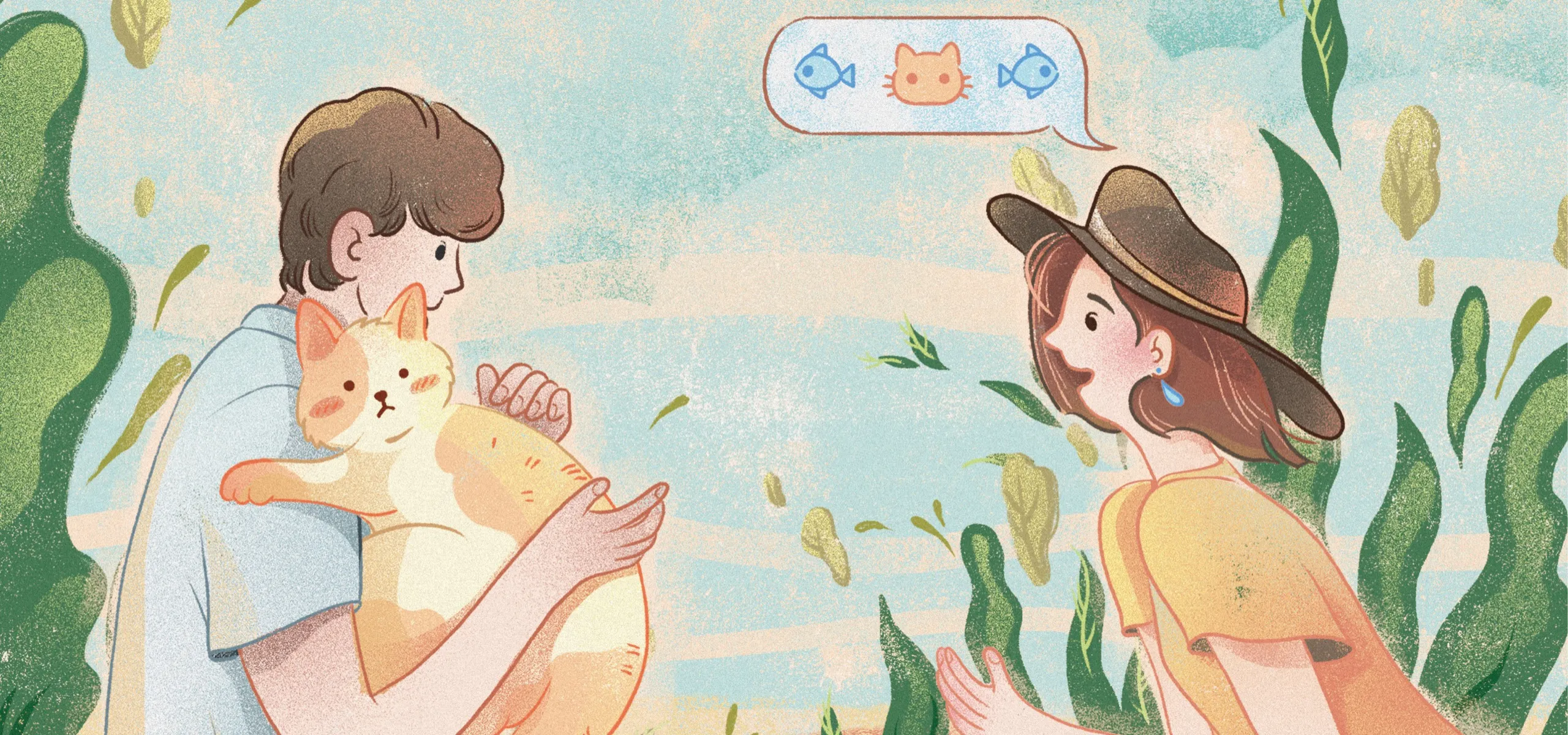How to talk about (and to) your four-legged friends in Chinese
Ever feel like your pet could use some acupuncture? How about a weekend away in a doggy hotel and spa? For China’s booming pet market, there is seemingly no end to the ways people can choose to show love to their pets—whether it’s buying products and services to pamper them during their lifetime, or holding expensive funerals and even hiring mediums to “communicate” with them once they’re deceased.
With 68 million people in the country keeping one or more pets as of 2021, according to a report by the China Animal Agriculture Association, pet ownership is no longer just a matter of living with an animal in your home. It’s an emotional investment, a lifestyle, and a culture of interaction with non-human family members to love, have fun with, and sometimes complain about.
Like any subculture, pet ownership also comes with its own unique lingo that you might find yourself adopting once you welcome a non-human companion into your life.
Establishing an identity
When large numbers of urban Chinese families began keeping pets in their homes in the reform period of the 1980s, they called these animals 宠物 (chǒngwù, literally “pampered animal”) to distinguish them from livestock and other functional animals.
But you’ll rarely catch a young person calling their furry companion that today—rather, they’ll satirically refer to them as the 主子 (zhǔzi, master) or 毛孩子 (máoháizi, fur baby) who is demanding all their attention and eating them out of house and home:
My master’s daily routine consists of nothing but eating and sleeping.
我家主子的日常,除了吃就是睡。
Along with this reversal of power between pets and humans, a popular term for pet owners today, usually used self-deprecatingly by owners themselves, is 铲屎官 (chǎnshǐguān, excrement removal officer), indicating their main role in relation to the “master” of their home. Those with cats specifically may even refer to themselves as 猫奴 (māonú, slave to cats), perhaps due to cats being perceived as more demanding and emotionally distant toward their human owners, who nevertheless devote themselves to their feline masters’ care:
Have a cat for one day, be a slave for your whole life.
一日养猫,终身为奴。
Counting the cost
Keeping a pet isn’t cheap. The scale of China’s pet economy (宠物经济 chǒngwù jīngjì) is estimated to reach almost 446 billion yuan in 2023. Even if you stay away from fads like pet acupuncture, the cost of food, registration, medical checkups, and toys adds up, not to mention the money needed to obtain the pet in the first place for those seeking fancy breeds. This could be ruinous to young graduates juggling their first job and first apartment, while taking care of a pet to ease their loneliness:
My fur baby gets sick once, and I might lose a whole month’s savings, maybe several months’.
毛孩子病一回,一个月甚至几个月的积蓄就没了。
Taking my cat to the vet costs thousands of yuan…More expensive than going to the hospital myself.
带宠物去一次医院就花了上千元,比我看病还贵。
Nevertheless, true “slaves” to their pets will splurge on their fur babies, even if they are very cheap with themselves:
I wear a 30 yuan vest, but spent 6,000 yuan to buy toys for my pet.
我穿着30的背心,却给宠物花了6000块买玩具。
Ever since I became a poop removal officer, my online shopping cart is filled with stuff for my cat.
自从当了铲屎官,购物车基本都是猫的东西。
Always the troublemakers
Pets are not always well-behaved. Whether it’s when they’ve destroyed the sofa, eaten important documents, or regurgitated the remains of the household plants they ate, few poop-pickers have never complained about their pets making trouble (惹祸 rěhuò):
My leather sofa has already been destroyed, and the fabric one I replaced it with is also torn to ribbons.
我家的真皮沙发已经挠废了,换成布艺沙发,还是被挠得一丝丝的。
These furry masters also have their own notions of how their living environment ought to look. Perhaps they like to rearrange your belongings as they see fit, sleep in empty boxes despite the thousands of yuan you spend on beds for them, or play with trash rather than their new toys:
We have two big sofas and a dozen dog beds, yet you insist on lying on the carton of eggs.
家里有俩大沙发、十几个舒服的狗窝,你非得躺鸡蛋上。
In my cat’s mind, Christmas trees should lie flat on the ground, and walnut shells should be put into my shoes.
在我家猫咪的认知里,圣诞树是应该铺在地上的,核桃皮是应该放在鞋里的。
Talking back
A 2015 survey by Guomin.com, the country’s biggest web portal on pets, found that over 51 percent of pet owners in China are single. While the same study found that nearly 80 percent of these poop-pickers were born after 1980, there’s also a rising population of senior citizens keeping companion animals.
Chances are, these “empty-nest seniors (空巢老人 kōngcháo lǎorén)” and “empty-nest youths (空巢青年 kōngcháo qīngnián)” are treating their pets like family members—a 2016 article from Youth.cn (which unfortunately doesn’t cite sources) claims that as many as 98 percent of pet owners admit to talking to their pets, which seems plausible, given the typical content of videos one finds from pet owners on platforms such as Douyin:
Kid, why did you come home so late? Were you chatting up the female cats again?
乖乖,这么晚才回来,又去哪儿搭讪小母猫了呀?
Your Majesty, please accept a gift of dried fish from your servant.
陛下,奴婢献上小鱼干。
Others take it a step further, and imagine that the pets actually reply—there’s no shortage of online memes featuring a cat’s disdainful stare. The caption is usually written from the feline’s perspective with 朕 (zhèn), the first-person pronoun reserved for emperors, similar to the royal “we”:
There are always riff-raff wishing to do harm to us.
总有刁民想害朕。
But we love them
Despite their complaints, owners really do love their pets. A recent survey by Southern Metropolis Daily showed that over half of the 1,060 respondents chose to have pets for companionship, while over 75 percent professed to love animals:
I can’t help it! My fur baby is so cute, and I hate that I can’t give him the whole world!
没办法啊!毛孩子太可爱了,恨不能把全世界都给它!
Some might argue that it’s really the pets that unconditionally love their owners—and for retirees whose adult children have moved out, or youngsters beaten down by the grind of work and relationships in the modern age, the emotional support, trust, and enjoyment they get from their pets is priceless:
Thank you for spending half of your life waiting for me—waiting for me to get home, to play with you, to pat your head and tell you you’ve been good today.
谢谢你花了大半生的时间,只为等待我。等我回家、等我陪你玩、等我摸摸你的头,称赞今天的你好棒棒。
As long as I take you out for a walk, and give you some snacks, you are satisfied.
只要带你散步,给你小零食,你就心满意足。
In fact, sometimes it’s hard to tell who is raising whom:
It looks like I take care of you, but actually, you’re the one keeping me company.
看似是我照顾你,其实是你在陪伴我。
The Secret Life of Chinese Pets is a story from our issue, “The Data Age.” To read the entire issue, become a subscriber and receive the full magazine.












